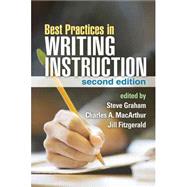Summary
An indispensable teacher resource and course text, this book presents evidence-based practices for helping all K-12 students develop their skills as writers. Every chapter draws clear connections to the Common Core State Standards (CCSS). Leading authorities describe how to teach the skills and strategies that students need to plan, draft, evaluate, and revise multiple types of texts. Also addressed are ways for teachers to integrate technology into the writing program, use assessment to inform instruction, teach writing in the content areas, and tailor instruction for English language learners and struggling writers. Helpful case examples are featured throughout.
New to This Edition
*Revised and expanded to address the CCSS.
*Incorporates the latest research and instructional procedures.
*Chapters on teaching argumentative and informative writing.
*Chapters on college and career readiness, writing to learn, writing about texts, and response to intervention.
Author Biography
Steve Graham, EdD, is the Warner Professor in the Mary Lou Fulton Teachers College at Arizona State University. A current editor of the Journal of Writing Research, he has received many awards, including the Career Research Award from the Council for Exceptional Children, and is a Fellow of the American Educational Research Association. The author or editor of numerous books on writing instruction, he is coeditor of the Guilford series What Works for Special-Needs Learners. His research focuses on identifying the factors that contribute to writing development and writing difficulties, developing and validating effective instructional procedures for teaching writing, and the use of technology to enhance writing performance.
Charles A. MacArthur, PhD, is Professor of Special Education and Literacy in the School of Education at the University of Delaware. He served as coeditor of the Journal of Special Education and serves on the editorial boards of several other journals. His major research interests include writing development and instruction for struggling writers, adult literacy, development of self-regulated strategies, and applications of technology to support reading and writing. Dr. MacArthur has published over 100 articles and book chapters and several books, including the Handbook of Writing Research (coedited with Steve Graham and Jill Fitzgerald).
Jill Fitzgerald, PhD, is Distinguished Research Scientist at MetaMetrics in Durham, North Carolina, and Professor Emerita at the University of North Carolina at Chapel Hill, where she is currently Adjunct Research Professor in the School of Education. She is a recipient of the American Educational Research Association's Outstanding Review of Research Award and the International Reading Association's Dina Feitelson Research Award, and is a member of the Reading Hall of Fame. Her research interests center on literacy issues for multilingual learners and understanding text complexity. With more than 100 publications, Dr. Fitzgerald is associate editor of the Journal of Educational Psychology and serves on the editorial boards of several other journals.
Table of Contents
I. Designing Writing Programs
1. Designing an Effective Writing Program, Steve Graham and Karen R. Harris
2. Writing Instruction in Preschool and Kindergarten, David L. Coker, Jr.
3. Best Practices in Teaching Writing for College and Career Readiness, Dolores Perin
II. Types and Purposes of Writing
4. A Developmental Approach to Teaching Narrative Composition, Anne McKeough
5. Best Practices in Teaching Argumentative Writing, Ralph P. Ferretti and William E. Lewis
6. Best Practices in Teaching Informative Writing from Sources, George E. Newell, Jennifer VanDerHeide, and Melissa Wilson
7. Best Practices in Writing to Learn, Perry D. Klein and Amy Meichi Yu
III. Strategies for Teaching and Learning in Writing
8. Best Practices in Teaching Planning for Writing, Cindy Lassonde and Janet C. Richards
9. Best Practices in Teaching Evaluation and Revision, Charles A. MacArthur
10. Best Practices in Sentence Construction Skills, Bruce Saddler
11. Best Practices in Spelling and Handwriting, Bob Schlagal
12. Best Practices in Promoting Motivation for Writing, Pietro Boscolo and Carmen Gelati
13. Best Practices in Using Technology to Support Writing, Rachel Karchmer-Klein
14. Best Practices in Writing about Text, Timothy Shanahan
15. Best Practices in Writing Assessment for Instruction, Robert C. Calfee and Roxanne Greitz Miller
IV. Special Populations
16. Best Practices in Teaching Writing to English Learners: Reducing Constraints to Facilitate Writing Development, Carol Booth Olson, Robin Scarcella, and Tina Matuchniak
17. Writing Instruction within a Response-to-Intervention Framework: Prospects and Challenges for Elementary and Secondary Classrooms, Gary A. Troia

